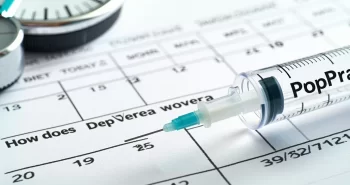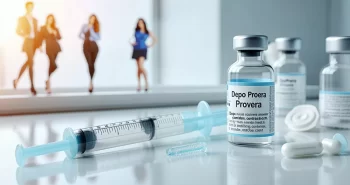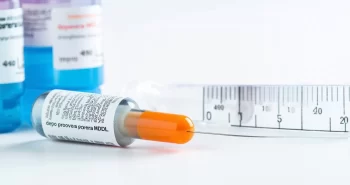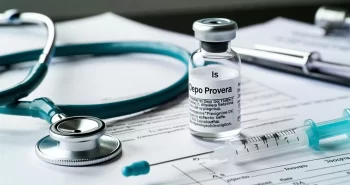Depo‑Provera Blood Clots: When It May Support a Claim
 Fact Checked By Our Attorneys
Fact Checked By Our Attorneys


Depo Provera blood clots can cause serious complications, and you may have a legal right to seek compensation. If you’ve been affected by blood clots after using Depo-Provera, Legal Claim Assistant can connect you with experienced attorneys who handle these cases and guide you through the legal process.
Table of Contents:


Understanding Your Legal Options for Depo Provera Blood Clots
Okay, let’s break down what happens when you get a Depo Provera shot. It’s a birth control option that uses medroxyprogesterone acetate—basically, synthetic progesterone that’s used to mimic a natural hormone in your body. Sounds fancy, but it’s simple: the shot stops ovulation, thickens your cervical mucus to slow sperm down, and makes your uterine lining a non-ideal meeting spot for sperm and egg.
Hormonal Effects of Depo Provera
So what’s going on with hormones when Depo Provera enters the scene? It shakes up the normal hormonal symphony. Ovulation takes a back seat, no eggs getting the release warrant, which means fewer chances for bun-in-the-oven moments. The progestin in the shot switches up the cervical mucus game too, making it more challenging for sperm to win any races in the reproductive tract.
Impact on Circulation and Blood Clot Risk
While Depo Provera is a solid guard against surprise parenthood, it has a flip side—a nudge up in blood clot risk. There’s a chance of facing blood issues like deep vein thrombosis (DVT) or pulmonary embolism (PE). According to the World Health Organization (WHO), it’s labeled “low to moderate” in terms of thromboembolic risk, especially in those with prior risk factors (HelbockLaw).
Compared to other contraception like the pill, any hormonal method comes with a slightly higher blood clot ticket. The numbers talk: if you’re on combined oral contraception, your thrombosis risk can be three-to-five times more, though for healthy folks, that’s just a tiny 0.05% per year (NIH PMC). It’s the hormones causing the stir.
So if Depo Provera is your go-to, keep on your radar for clot indicators—think leg pain, swelling, or redness that might mean DVT. Or if you’re catching your breath quickly and have chest pain, that could be a PE scenario, both of which need a doctor’s visit pronto.
Knowing how Depo Provera plays with your hormones and circulation helps you keep an eye out for unwanted side effects. If you’ve hit some road bumps with it, chat with your healthcare provider. They can guide you on the next steps if you’re thinking you need a little justice for any medical misadventures.
Potential Legal Claims for Blood Clot Injuries
As someone who’s used the depo provera shot and might be facing some side effects, recognizing signs of blood clots is super important. These clots can show up with different symptoms, and catching them early is key. While everyone won’t have the same signs, knowing what to keep an eye on if depo provera’s the culprit is vital.
Symptoms to Look Out For
Blood clots can make their presence known in sneaky ways that definitely need a doctor’s look-see:
| Symptom | Description |
|---|---|
| Pain or Swelling | Out-of-the-blue pain, tenderness, or swelling, often in a leg. |
| Red or Discolored Skin | Skin might go from normal to red or weirdly colored, and feel hotter than the nearby areas. |
| Warmth in the Area | The spot could feel warmer than the rest of your skin due to all that extra blood flow trying to get through. |
| Visible Veins | Those veins might puff up and become way more noticeable, especially in the limb that’s aching. |
Additional Symptoms
Other signals to watch for, especially if a clot’s made its way up to your lungs, are:
- Shortness of breath or trouble breathing
- Chest pain that gets worse with deep breaths or when you cough
- Racing heartbeat
- Coughing up blood
- Feeling dizzy or faint
If any of these pop up after using depo provera, it’s your cue to get medical help immediately. Spotting and treating blood clots pronto can keep big problems like deep vein thrombosis or pulmonary embolism at bay. For more scoop on depo’s potential side effects, take a peek at depo provera side effects.
Being clued in on the signs of blood clots tied to depo provera means you can act fast and put your health first. Should any red flags appear, don’t think twice about reaching out to a healthcare professional or heading to the ER for a checkup. Keeping on top of these symptoms is all about ensuring you get the right care as quickly as possible. Your health’s got to be numero uno, and being watchful can make all the difference.
Eligibility for a Depo Provera Blood Clot Lawsuit
So, you’re thinking about birth control options, and Depo-Provera is on your list. It’s a convenient shot, but beware: it might raise your risk of blood clots like deep vein thrombosis (DVT) and pulmonary embolism (PE), which aren’t exactly a walk in the park. So let’s break it down: who needs to be extra cautious with this type of contraceptive? Here’s the scoop.
Factors Affecting Clotting Risk on Depo-Provera
There are a few things that might make you more prone to clots if you take Depo-Provera:
- Medical History: If you’ve wrestled with blood clots before, or if clotting problems run in the family, your chances might be higher.
- Smoking: Lighting up, especially if you’re over 35, can make blood clots more likely when you add hormonal contraceptives like Depo to the mix.
- Obesity: Those extra pounds can put undue pressure on your vascular system, upping the clotting risk.
- Sedentary Lifestyle: If you’re not moving around much or you’re stuck sitting for long times, your blood flow takes a hit, and clots can form easier.
- Certain Medical Conditions: High blood pressure, diabetes, heart issues—any of these can stack the odds against you.
- Age: Ladies over 35—time to listen up—using hormonal birth control is a bit riskier where clots are concerned.
Comparative Risk of Blood Clots
Even with these risks on the table, the chance of a clot developing with hormonal birth control like Depo is still on the low side. However, each person is different, so it’s best to chat with a healthcare provider before jumping in or sticking with Depo-Provera, especially if the thought of clots is sending up red flags for you. Always stay on top of how you’re feeling on Depo. If anything feels off or you’re worried, see a doctor ASAP to catch and handle any trouble quickly. Make informed choices about your birth control and stay safe!
Documenting Evidence for Your Depo Provera Case
When you dig into the connection between Depo-Provera and blood clots, here’s what the science has to say about this birth control option and its possible risks involved.
The World Health Organization (WHO) ranks Depo-Provera as having a “low to moderate” bump in thromboembolic risks, especially in women who already have risk factors. While the risk is generally on the lower side, some individuals might have a higher chance of getting blood clots while on Depo.
Research points out instances of deep vein thrombosis (DVT) and pulmonary embolism (PE) among folks using Depo-Provera, even though it’s got a lower clot risk compared to estrogen-type birth control. This serves as a nudge to understand your personal risk factors and have a chat with your healthcare provider before jumping into using Depo-Provera.
The U.S. Food and Drug Administration (FDA) and WHO are on the same page, suggesting healthcare providers should screen patients for clotting risks before handing out Depo-Provera. Extra caution is advised for women who smoke, are overweight, or have a history of clotting disorders.
If you’re on Depo-Provera, being aware of its clot-associated risks is a must. Statistically, Depo-Provera hikes the risk of blood clots about 3.6 times above normal levels (GoodRx).
In a nutshell, it’s crucial to take a close look at one’s health and risk factors before opting for Depo-Provera as your birth control buddy. Knowing the clot risks associated with this method is key to mFaking smart decisions about your reproductive health.
Filing a Depo Provera Blood Clot Lawsuit
Let’s shine a light on the potential bumps in the road when it comes to Depo-Provera, especially those serious ones, like Deep Vein Thrombosis (DVT) and Pulmonary Embolism (PE), which can take a real toll on your health.
What Are DVT and PE?
Imagine traffic jams inside your body. DVT is like a slow-moving car clogging up the deep veins—most often in the legs. If this “car” hits freeway speeds and zooms to your lungs, you get a PE, blocking the pulmonary “highway” and causing quite a jam.
What Puts You at Risk for These Conditions?
Here’s what might push the risk needle up when you’re on Depo-Provera:
- Being still for too long – too much couch time or long flights
- A backstory of pesky blood clots
- Excess weight carrying around
- Puffing on cigarettes
- Family quirks in blood clotting
What Does Research Say?
There was this deep dive into how Depo-Provera and a certain IUD might ramp up the chance of getting a leg clot (Study Source). If you’re a magnet for clots, maybe keep hormones out of your birth control toolbelt (FDA Warning).
Ways to Prevent and Treat
For those who have clots looming, healthcare pros often whip out the big guns like warfarin and its pals rivaroxaban or dabigatran to stop clots in their tracks and steer clear of strokes related to atrial missteps (Treatment Options).
Heads-Up from the Regulators
Back in 2012, the FDA waved a flag about certain pills with drospirenone upping the blood clot ante threefold. So, know the terrain when it comes to side effects from things like Depo-Provera (FDA Advisory).
If Depo-Provera might be leading you down the DVT or PE path, it’s key to be alert. Should you experience any signs of blood clots, hit the brakes and talk to a doctor ASAP. It’s all about keeping your health on the straight and narrow, so don’t hesitate to get any symptoms or side effects checked out. Your health? Top priority.
Are There Warnings About Clots on the Label
If you’re thinking about using Depo-Provera, knowing the ins and outs of any possible risks is a must. The U.S. Food and Drug Administration (FDA) and the World Health Organization (WHO) have both flagged some important points to consider, especially when it comes to clotting concerns.
According to the folks over at Mayo Clinic, using Depo-Provera for the long haul might leave your bones feeling a bit less sturdy – think osteoporosis risks. They suggest keeping usage under the two-year mark to hopefully dodge any skeleton-related surprises, even if the whole fracture thing down the line isn’t fully clear.
Speaking of clots, docs are pretty big on checking you over for any clot-friendly risk factors before handing you a Depo-Provera prescription. Extra caution is the name of the game if you’re a smoker, dealing with obesity, or have a history with thromboembolic disorders (HelbockLaw). WHO says there’s a “low to moderate” uptick in clot incidents with Depo-Provera, especially if you’ve got existing risk factors (HelbockLaw).
Depo-Provera’s got a bit of a reputation for hiking up your blood clot odds—around 3.6 times the usual risk, to be more specific (GoodRx). This high chance can show up as deep vein thrombosis (DVT) or even a pulmonary embolism (PE), and these are definitely not the kind of surprises anyone wants, despite the birth control benefits (HelbockLaw).
So if you’re thinking about using or are already on Depo-Provera, don’t skip on getting the full scoop on these risks. Talking things over with your healthcare person is always a smart move, especially if there’s anything off, like pain or unusual symptoms. Catching these things early can make a big difference. Keep yourself informed to make the best choices for your birth control and overall health, and if something feels off, don’t hesitate to get medical help—better safe than sorry, right?
What to Do If You Experience Pain or Swelling
So, you’re on Depo-Provera and something feels off—pain or swelling shows up unexpectedly. Don’t shrug it off as a minor glitch. These could signal a more serious issue, like a blood clot. Let’s lay down a plan for dealing with this.
- Call for Backup (That’s Your Doctor): Any sharp or intense pain or swelling deserves serious attention. Drop everything and get in touch with your healthcare provider or head to the emergency room. Acting quickly is your ticket to detecting and managing any serious complications early on.
- Press Pause: If you’re even a bit suspicious about Depo-Provera being the culprit, pressing pause on the medication might be wise. Still, run this decision through your doctor first—they’ll help navigate to other birth control methods that might be safer bets for you.
- Be Your Own Investigator: Take note of every twist and turn with your symptoms—it can be surprisingly insightful. Keeping this symptom journal handy when talking to the folks in white coats can make a world of difference in zeroing in on the issue.
- Hands Off the Medicine Cabinet: Don’t start popping those over-the-counter pain pills like they’re candy. Without your doc’s green light, they can sometimes stir up trouble or mess with Depo-Provera’s mojo.
- Revisit Your Healthcare Provider: Circle back to your healthcare provider after that initial check-up. They might suggest some extra tests or actions to really nail down what’s happening with your body.
- Become a Side-Effects Whiz: Arm yourself with the know-how about what Depo-Provera can throw your way, including the scary stuff like blood clots. This heads-up helps you stay two steps ahead and keep your health in check.
Wondering if you could have a legal standing due to ripple effects from Depo-Provera, like blood clots? You might have a shot at compensation. Reach out to legal pros who handle pharmaceutical lawsuits to get the scoop on how this could play out for you.
Your health tops everything. Stay sharp, act swiftly, and team up with your healthcare providers to tackle any issues tied to Depo-Provera. This take-charge style at handling symptoms isn’t just about nipping risks in the bud but also about getting the right care lined up.
When to Go to the Emergency Room
If you’re using Depo-Provera and something feels off, don’t wait around wondering if it’s serious. Especially when it comes to signs of blood clots—these can mean business. Here’s when you should drop everything and get yourself to the nearest emergency room:
- Chest feeling like it’s in a vice grip? Struggling to breathe or seeing blood in your cough? These are big, red flags.
- A stomachache that’s more like a gut punch? Especially if it crops up suddenly and won’t quit.
- Got a headache that feels like a sledgehammer, with dizziness, or strange feelings only on one side of your body? This isn’t your average headache—get it checked out.
- Notice any weird swelling, hot spots, or tenderness in your leg or arm? It might be a sign of a deep vein thrombosis (DVT)—a fancy way of saying there’s a clot where there shouldn’t be.
- Breathing suddenly feels like you’ve sprinted a marathon, and you’re just sitting on the couch? Not good—seek help pronto.
- Coughing and notice some blood, or any unusual bleeding going on? That’s your cue to hightail to the ER.
- Vision acting up with blurriness, seeing doubles, or even partial blindness? Time to get that looked at.
These clues might point to something like a pulmonary embolism (PE) or a DVT, both of which are serious risks tied to Depo-Provera. Swift medical evaluation ensures you get the right care.
Making your health numero uno is non-negotiable when you’re on Depo-Provera. Don’t ignore vibes that something’s wrong—it’s better to play it safe and be sure. Trust your instincts when weird symptoms pop up; getting medical help right away could spare you from anything more serious.
Your health is precious, so don’t skimp on it. Quick responses in scary health moments can make all the difference. You got this—take care of you.
Can You Be Compensated for Clot Related Injuries
So, you tried Depo-Provera and now you’re dealing with some heavy-duty issues like deep vein thrombosis (DVT) or a pulmonary embolism (PE)? You’re not alone, and there might be some cash headed your way because of these troubles. A bunch of women have taken Pfizer to court because they believe the birth control shot caused their blood clots. These cases argue that Depo-Provera is linked to some nasty side effects, and if you’re caught up in this ordeal, you might have a shot at getting some money out of it.
The FDA put the word out back in 2012 that using certain birth control pills with drospirenone could increase your chances of getting blood clots by three times the norm. Studies suggested that with some birth control methods, about 6 out of every 10,000 women yearly could develop nasty venous thromboembolism (VTE) clots. Not great news, right?
If you’ve been unlucky enough to face these clot-related problems because of Depo-Provera, it’s wise to get in touch with a lawyer. They can tell you if you have a strong case and help you figure out how to hold those responsible for your troubles to account. Sometimes, this could mean getting the cash you need for your medical bills, ongoing treatments, and even for the pain and troubles you’ve been through.
Compensation isn’t just about the money—it’s about getting a bit of justice. If you’re feeling the effects of blood clot issues from Depo-Provera use, you’ve got to look into it further. Talk to a legal team that knows the score with pharmaceutical cases to see what you might be owed. They’ll help you sort through the options so you can decide the next best step for confronting the harm that’s come your way.
How to File a Depo Provera Lawsuit for Blood Clots
Had a rough go with Depo Provera and ended up with blood clots? You’re not alone, and you might be able to snag some compensation for your troubles. If the Depo shot gave you more than you bargained for, like those dreaded blood clots, it might be time to get some legal firepower. Here’s how the Legal Claim Assistant can hook you up with the perfect lawyer to go after that Depo Provera blood clot lawsuit.
Getting the Legal Ball Rolling
Taking on Pfizer, the folks behind Depo Provera, isn’t a walk in the park. But no worries! The Legal Claim Assistant’s got your back, especially in dealing with these Depo Provera cases. They’ll help you untangle the legal web and guide you through every step if you’re aiming to take legal action for those pesky blood clots.
Are You Eligible for Compensation?
Before you jump in, we need to figure out if you’re a contender for some compensation. If Depo Provera’s left you battling serious stuff like deep vein thrombosis (DVT) or a pulmonary embolism (PE), you might have a solid case. The Legal Claim Assistant is on hand to check out your situation and see if you’re in line for a payday.
Finding the Right Lawyer
Aiming for a win? You’ll need a lawyer who knows their stuff, especially with Depo Provera blood clot cases. The Legal Claim Assistant has a roster of legal pros geared up to take on your case. Once they link you up, you’ll be covered with top-notch legal skills and guidance throughout the ordeal.
Chasing After Compensation
If you hit the jackpot in court, you could be seeing cash for medical bills, pain, suffering, paycheck gaps, and any other nasty bits your blood clot saga brought on. The Legal Claim Assistant will team up with you to nail down compensation for everything you’ve gone through physically, emotionally, and financially thanks to Depo Provera.
With the right legal crew in your corner, courtesy of the Legal Claim Assistant, you’re set to face the legal circus with some confidence and get the justice you deserve. If Depo Provera has wronged you and you’re ready to fight back, hit us up for professional help by signing up for that Depo Provera lawsuit right here.













